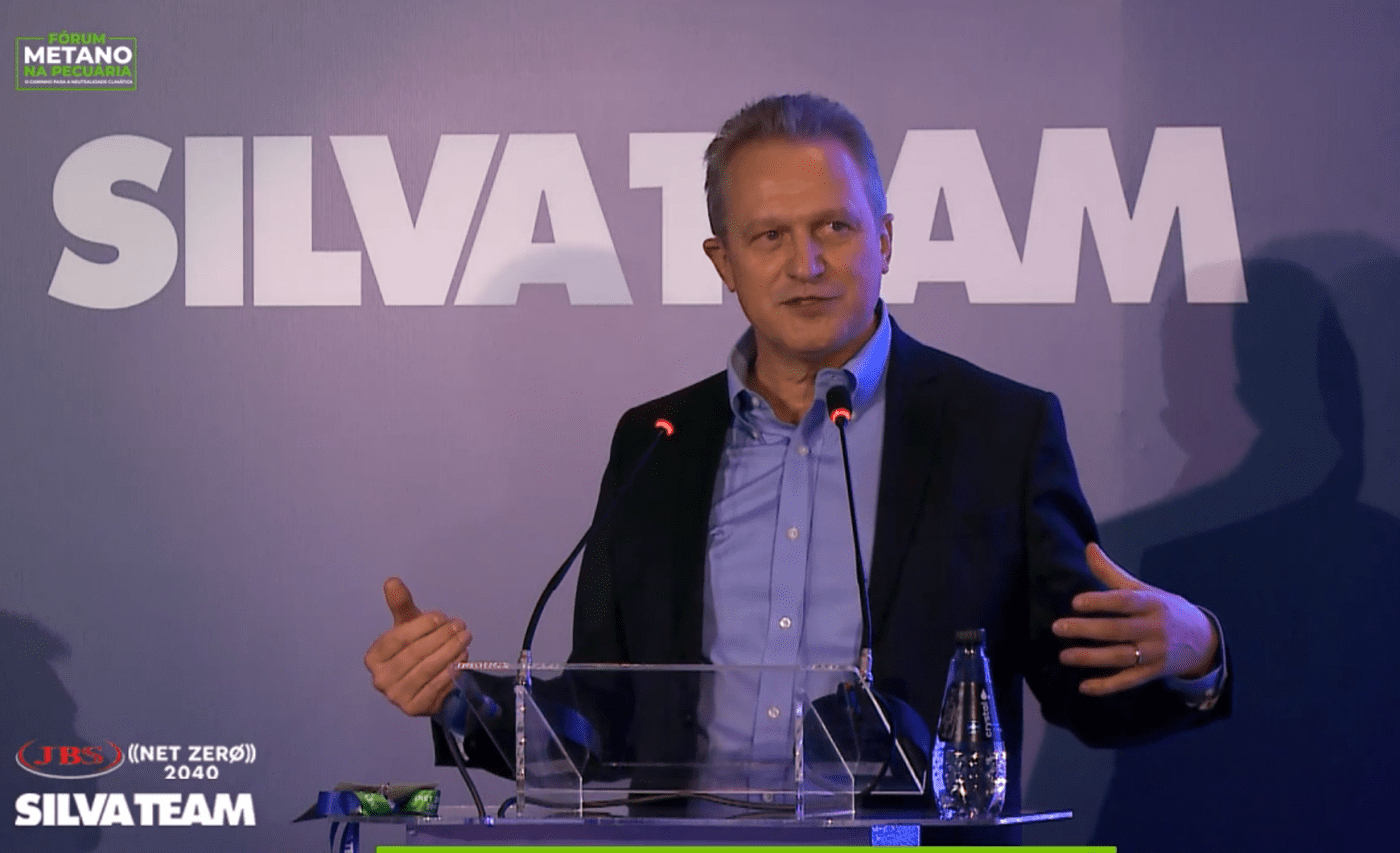
JBS global CEO Gilberto Tomazoni recently addressed a global sustainability forum.
THE head of the world’s largest meat processing business says his company is still trying to work out how it will reach its target of “net zero emissions by 2040.”
Earlier this month, JBS held an online global methane forum out of Brazil, which hosted delegates from across the world. (Click here for previous Beef Central story)
While there was plenty of information about the workings of methane and strategies to reduce the amount produced by the red meat industry, JBS Global CEO Gilberto Tomazoni gave an insight into the challenges the company is facing to reach its target.
In a translated speech, Mr Tomazoni said the company had made significant advances in managing its emissions, including its partnership with feed additive company DSM – but it was still searching for more answers.
“We are committed to (reaching net zero by 2040) and we believe that science is going to give us the answers that we still don’t have,” he said.
“That is why we need to come together and have discussions, so we can generate knowledge and generate best practices. If there is a core word for us when we need to do something like this, it is learning.”
Mr Tomazoni said the company had appointed “green officers” to help other companies within its supply chain to transition towards the target.
“We have already made some agreements with some banks to create funding lines for breeders to be able to support this transition,” he said.
“If we can reduce enteric fermentation with the use of some mechanisms, why not do it because we know that beef is the most complete kind of food that we have.”
It’s not the challenge of one single company, it’s the challenge of the world
Mr Tomazoni also addressed the company’s deforestation agenda, which is its aim to have zero deforestation across its global supply chain by 2035.
“Brazil is a disintegrated supply chain, so we have to do the work of ensuring the provider of the provider and the supplier of the supplier,” he said.
“Now we have decided to use blockchain technology to ensure the accountability of the data, but there is no use saying to people ‘you are not going to produce for me’, we need to help them be incorporated. It’s not the challenge of one single company, it’s the challenge of the world.”
Feeding the world
The world’s growing population was also on the agenda for Mr Tomazoni, who said food production was going to come under pressure.
“We are going to have an extra two billion people by 2050, we are going to need more food. If you look at our lifestyles, we are eating up the planet,” he said.
“We are taking more resources than the world can provide and the way we are growing we are reducing the capacity of the world to produce food. For our company we need to our bit to produce food and reduce emissions.”
Mr Tomazoni said the company needed to make sustainability part of its culture to achieve its goals.
“We have put sustainability as an umbrella. Before we make an investment, we have to make sure it is sustainable as well as profitable,” he said.
“This makes it part of the culture, because we have 200,000 people in the company and they all need to make the right decisions.”

It defies belief, and the considerations of many, many Australians, that some of our very intelligent and qualified CEO’s, Board members and executives are caving in to the seriously misguided concept that Australian companies can make a measurable difference to the environmental future of the planet, in total (and some might say ignorant) isolation of the ongoing increasing outputs of China, the major emitter.
If Australia were working in concert with the major emitters, and the major emitters were actively (rather than rhetorically) reducing emissions, that would be different. However, that is not the case.
Disgracefully, our banks and various other institutions have adopted an environmental virtue signalling posture, having been beguiled by the international calls upon western nations to do more, while the major emitters (with China a mile ahead of the pack) are allowed to do less.
Our banks and insurance companies have been successfully bullied into believing that if they don’t submit, they will be isolated. All of this is in total disconnection to the significant international shifts which are a consequence of the invasion of Ukraine. Coal energy technology is being revived and expanded, as is nuclear, and the demand for gas has increased. Anyone with half a brain can work out that continuing to pursue idealistic environmental targets at this time is inappropriate. To do so is in denial of the current global security environment. There is no argument that sound environmental ambitions are to be applauded and supported, but for Australia, with it’s major defence partners far away in another hemisphere, all our important initiatives must now be toned down in favour of national security. Now is the time to to be realistic, rather than idealistic.